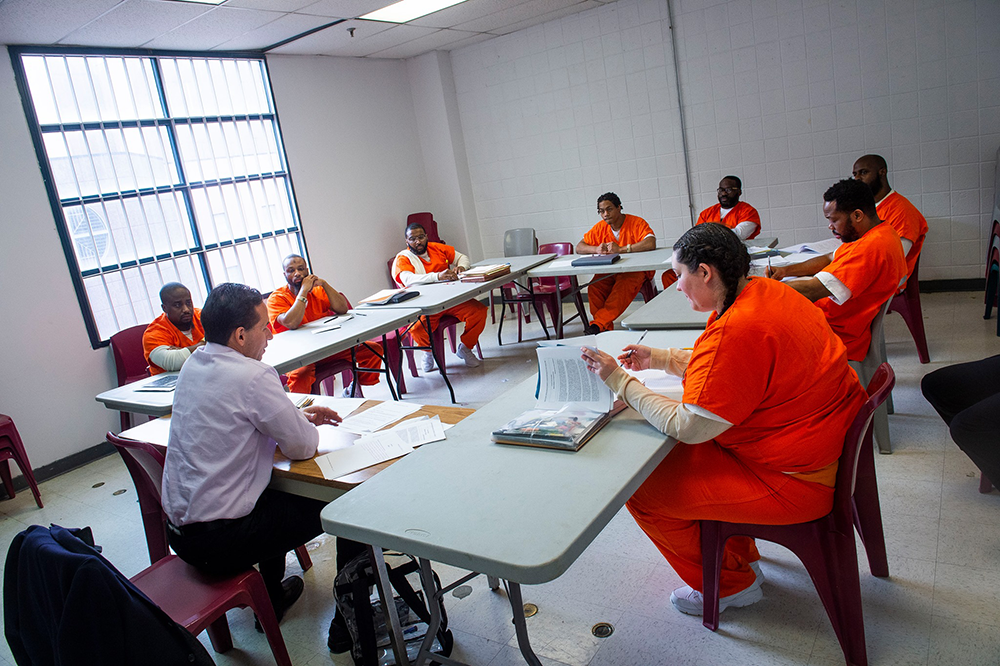Georgetown University students in professor Marc Howard’s “Prison Reform Project” class have released documentaries detailing the cases of incarcerated men who the students argue were wrongfully convicted.
Howard co-teaches “Prison Reform Project” with adjunct professor Martin Tankleff, a childhood friend who was exonerated after serving almost 18 years in prison for a wrongful murder conviction. For the past three years, the class has taken on several cases of wrongful convictions and created documentaries to prove innocence and aid in exoneration as a part of the “Making an Exoneree” project.

Two of the five documentaries that have been released as of June 1 analyze the cases of Jermane Scott, who is serving a life sentence without parole in the Mansfield Correctional Institution in Ohio, and Edward Martinez, who is serving a 55-year sentence at the United States Penitentiary, Beaumont in Texas. The students claim both men were wrongfully convicted.
Students Darcy Palder (COL ’21), Candis Ferrell (COL ’20) and Leigh Bianchi (COL ’21) created the documentary, titled “Justice for Jermane,” in hopes of making an argument for why the original conviction should be overturned (Full disclosure: Palder previously served on the editorial board of The Hoya).
Scott is a native of Springfield, Ohio. He was charged and convicted for murdering Bertram Thomas in Thomas’ home in 1996. The documentary picks apart the details of Scott’s case, noting flaws in the accusations and investigation. Police in the case used erroneous evidence and improper investigation tactics to prove Scott’s guilt, according to the documentary.
The students’ first goal is to get legal representation for Scott and raise awareness about the case, according to Palder.
“Before he’s released he’ll need to go through a lot of legal proceedings and we need some people who can lead that charge. So along with getting media attention for the case, we’re also planning to reach out to some law firms and to some contacts who can hopefully help with that part,” Palder wrote in an email to The Hoya. “Our ultimate goal in releasing the documentary is obviously his release. However, we know that’s the long-term goal. The short-term goal is that we wanted to show the world why he deserves to be exonerated.”
The students interviewed members of Scott’s family, law enforcement experts and Scott as part of their investigation. Originally, the group intended to travel to Ohio to speak with Scott. After the COVID-19 pandemic began, however, they were restricted to video visits set up by Howard and the prison’s warden.
Although the visits were a crucial aspect of the documentary, talking to Scott was the most difficult part of its creation, Palder said.
“We did almost 5 drafts of the documentary in 2 days so we were grinding but none of that compared to how hard it is to speak to someone who doesn’t deserve to be in prison and not being able to help them,” Palder wrote. “As someone who has been thinking non-stop about my future and what’s coming next for me in terms of jobs and life, to imagine being barred from thinking about that for 24 years, it just kills me.”
Because of apprehension in the community, the students advertised an anonymous tip line and a petition to advocate Scott’s release alongside the documentary.
The tip line has already provided the students with at least one source, according to Bianchi.
“Jermane’s case is a complicated one, and it’s easy for people to write him off as guilty if they do not deeply look into his case,” Bianchi wrote. “If you do so though, you find that the case of his evidence is very convincing. I felt that Jermane is no less deserving of justice simply because his case is more complicated than others.”
Students Cecily Burge (COL ’21), Johnsenia Brooks (COL ’20), and Austin Riddick (COL ’20) released a documentary titled “Walk Tall,” May 27 to explain why Edward Martinez was wrongfully convicted.
Martinez was convicted of first-degree murder after a passenger in a car he was driving shot and killed David Hicks in 2003. Prosecutors accused Martinez of aiding and abetting the shooter, though Martinez maintains that he had no knowledge of or intention to assist the killing. The documentary details Martinez’s case, flagging flawed investigation tactics such as witness coercion and intimidation by detectives. Although Martinez was convicted, the passenger who shot and killed Hicks was never pursued or charged, according to the documentary. Martinez is hesitant to disclose details about his case or publish the name of the shooter for fear of retribution against his family. He is expected to be released in 2052, according to the documentary, when he will be 73 years old.
In 2018, students helped exonerate Valentino Dixon, a New York man who spent 26 years in prison. Students in the class have also helped obtain legal representation for other cases and are continuing to work toward securing additional exonerations.
Scott’s and Martinez’s cases were two of five cases chosen by students out of more than 100 requests for the spring 2020 semester, according to Howard.
The other three documentaries will be released in the coming weeks as the other groups work out some legal clarifications, according to Howard.
“For all five cases, we think the person deserves to be released from prison and exonerated, and we want to do everything possible to help them along that journey,” Howard said in an interview with The Hoya.




















